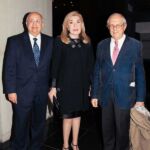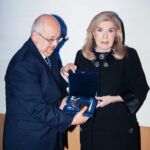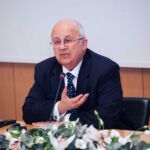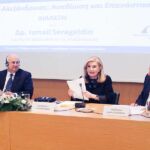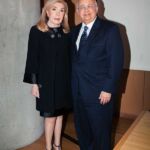On Wednesday morning, the President of the Hellenic Republic, Mr. Prokopis Pavlopoulos, received Dr. Serageldin at the Presidential Mansion, accompanied by Ms. Marianna V. Vardinoyannis, who is a member of the Advisory Board of the Bibliotheca Alexandrina and the founder of the Library’s “Centre of Hellenistic Studies”, together with University professor Christos Zerefos, who is a member of the Board of the “Centre of Hellenistic Studies”.
The President of the Republic highlighted the importance of the Library and the “Centre of Hellenistic Studies” for the harmonious coexistence of cultures and underlined the contribution of Dr. Serageldin and Ms. Vardinoyannis in promoting the common principles and values linking the Library with the field of Hellenistic Studies. “Ms. Marianna Vardinoyannis is our link, since she is not only a member of the Advisory Board of the Bibliotheca Alexandrina, but is also the founder of the library’s “Centre of Hellenistic Studies”. And I would like to believe that Greece has demonstrated with its cooperation that it is at your disposal, in order to be able to promote these common principles and values that connect the Library with the Hellenistic Studies”.
Ms. Vardinoyannis said: “I felt very fortunate when I was chosen to be one the first members of the Board of Directors of the Bibliotheca Alexandrina in 2006. And looking onto all our ancestors, present everywhere in the building, I felt that something needed to be done, because an entire period of our history was not mentioned anywhere in the Library. I thus proposed to Dr. Serageldin the creation of this Centre of Hellenistic Studies. Through our history, the entire world’s youth can learn about our country. This was the beginning, when we started out in 2006. And since then, Dr. Serageldin has done so much. He opened the library outwards, making it a beacon of culture for the entire world. And I believe that his contribution to this project is critically important. He will leave behind him this whole story of the Library, also through our effort with the Centre of Hellenistic Studies, for history. And what he has offered is very important, not only for our countries, but for the entire world. I would like to thank him warmly for giving me the opportunity to also contribute to the Centre of Hellenistic Studies, so we can make this effort together. Not only for his country and our country, but also for all the students that go there to study.”
Mr. Pavlopoulos accepted the proposal that was made to take under his auspices the Hellenistic Conference that will take place in 2017, with two poles: The one pole will be in Athens and the other in Alexandria, to present at a global level the importance of this exceptional period, the Hellenistic period, for humanity.
The issue of the Hellenistic Period, as well as the revival of the Library and its survival after the Arab Spring was the subject of the lecture given by Dr. Serageldin, that was organised on the same day by the Marianna V. Vardinoyannis Foundation at the amphitheatre of the Acropolis Museum.
The event was opened with a speech by Ms. Vardinoyannis, who noted among other things: “The presence of the director of the Bibliotheca Alexandrina and my dear friend, Ismail Serageldin, in Greece and at this place, is a great honour for our Foundation and for all of us. Dr. Serageldin is the soul of the Library and I was fortunate enough to having met him long before the Library opened in 2002. Through my participation in the first Board of Directors of the Library, I found myself at the side of Egypt’s first lady at the time, Suzanne Mubarak, and Mr. Mubarak for many years, and I experienced these historical moments before and after the revival. These were times that made me feel truly proud, not only of being Greek, but also of being a citizen of the world… Ismail Serageldin is an outstanding leader. He manages, but he also creates. His visions, his ideas, his ideals and philosophy rank him among the most multidimensional scholars, having authored more than 100 books. His dedication, industriousness, knowledge and respect, having put his soul into this historical mission, kept him in the same position, steadfast, for many years in the past and for many to come, I am certain… It was a time like this, when 26 years ago, on 12 February 1990, the historical meeting took place in Aswan, Egypt, where the Declaration for the revival of the Ancient Library of Alexandria was signed. With UNESCO at the forefront of this effort, with the wholehearted support of Egypt’s President at the time, Hosni Mubarak, and with other prominent personalities signing the declaration, such as the the President of France, François Mitterrand, Queen Sophia of Spain, Queen Noor of Jordan, and the late Melina Merkouri, it was the first step in making one of the greatest achievements of our history a reality. In the 14 years of its operation and valuable contribution to global culture, the Library is a temple of intellect and a beacon of knowledge for humanity. We Greeks are very much aware of, and deeply appreciate, this great contribution of the Egyptian state to humanity, which continues at an unwavering pace, and is supported by the President of Egypt, Abdel Fattah El-Sisi. We are inextricably linked, since the ancient library was directly related to ancient Greek intellect… We wanted to shine the light on the golden pages of the Hellenistic Period and this historical relationship, and to further demonstrate our support through the establishment of the “Centre of Hellenistic Studies” at the Bibliotheca Alexandrina, which was inaugurated in 2008 in cooperation with the “Alexander S. Onassis” Foundation. Today, the “Vardinoyannis Foundation” is the exclusive sponsor of this Centre, offering the opportunity to students from anywhere in the world to study on a pre-graduate and postgraduate level, history, literature, arts, archaeology, architecture and philosophy. We feel proud to be contributing to the Library and in general to the sciences, to culture and to the education of the younger generation with this Centre, and we are very lucky that Dr. Ismail Serageldin is the chairman of the Board of Directors…”
Professor Dimitris Pantermalis, President of the Museum of the Acropolis, also addressed the event while the Metropolitan George of Guinea, read the message sent by the Patriarch of Alexandria and All Africa, his Beatitude Theodoros II: “Ms. Marianna Vardinoyannis, we would like to address your event for the Bibliotheca Alexandrina, which is a source of light and a beacon of science. It is the new ark of knowledge and a meeting point of different cultures. We would like to congratulate and state our appreciation for Marianna Vardinoyannis and the members of the Board of the Foundation”.
University professor Christos Zerefos, who was coordinating the event, after welcoming the guests, congratulated Ms. Vardinoyannis, who, as he said “is wholeheartedly supporting the work of the new Library and is the soul of the Library’s “Centre of Hellenistic Studies”, and he thanked her for her initiative to organise Dr. Serageldin’s lecture. He then presented the work and personality of the speaker.
Dr. Serageldin took the floor, thanked Ms. Vardinoyannis for her contribution to the Library of Alexandria, by saying:
“I would like to extend my thanks to our dear Marianna Vardinoyannis, who was one of the founders of the new Bibliotheca Alexandrina, has served as a member of the BoD, and continues to support us with activities. She particularly insisted on the foundation of the “Centre of Hellenistic Studies”. I welcomed her initiative, we joined forces and proceeded forward. We started by educating new researchers who would focus on this period of history. We started with postgraduate degrees, and we now have the first PhD from the Hellenistic Centre. I cannot find enough words to thank Marianna Vardinoyannis for everything she has accomplished. She does so much, and doesn’t even think about it. She does everything in parallel… You have seen many works for which Ms. Marianna is responsible. She is also a Goodwill Ambassador, but we must say that she contributes to all the people of the world, and she is a patron of arts and letters”.
Then Dr. Serageldin mentioned that the Bibliotheca Alexandrina has one million visitors annually, while the Library’s website has two million visitors every day.
Referring to the ancient Library, which was the brightest beacon of knowledge and learning of the world, he spoke with admiration and awe about the fact that Ptolemy managed to get some of the greatest minds of the time to come there, like Archimedes, Eucleides, Aristarchus, Eratosthenes, and many others, who during their stay, managed to make universal knowledge richer with their discoveries. He noted that there were many great women, scholars, as well as women with power and authority who supported, developed and disseminated the work of the ancient Library of Alexandria, for example Berenice, Cleopatra and Zenobia. “However, Dr. Serageldin noted, the new Bibliotheca Alexandrina, as it is internationally known, was created thanks to the vision and insistence of one woman, Suzanne Mubarak, the wife of the former President of Egypt, and without her it would never have been built!”.
“The new Library, said Dr. Serageldin, referring to today, is a beautiful building, and we wanted to express the spirit of the ancient Library through it”. And to highlight how important his fellow Egyptians, and in particular the younger generation, believe that the Library and its work are, he described with emotion the protective shield which student formed around the Library during the Arab Spring: “They wrapped, he said, a huge flag around the Library, and they held hands forming a human chain around it. Not a single stone was thrown on the building, when a few blocks away the protesters were setting on fire a series of government buildings.”
Dr. Serageldin did not forget to refer to Greece’s contribution in the creation of the Library, and the many donations made by Greeks.
And in closing, he underlined: “We at the Library have committed to stand up to defend the principles and values of the ancient Library, with respect for human rights and the freedom of speech at the forefront!”.
After Dr. Serageldin’s speech, Ms. Vardinoyannis congratulated him, thanked him for coming to Greece to present the work of the Bibliotheca Alexandrina and she awarded him with the “Marianna V. Vardinoyannis 2016 Award” for his contribution to culture.
The event closed with an exceptional performance by soprano Katia Paschou, accompanied on the piano by Giannis Tsanakaliotis.


